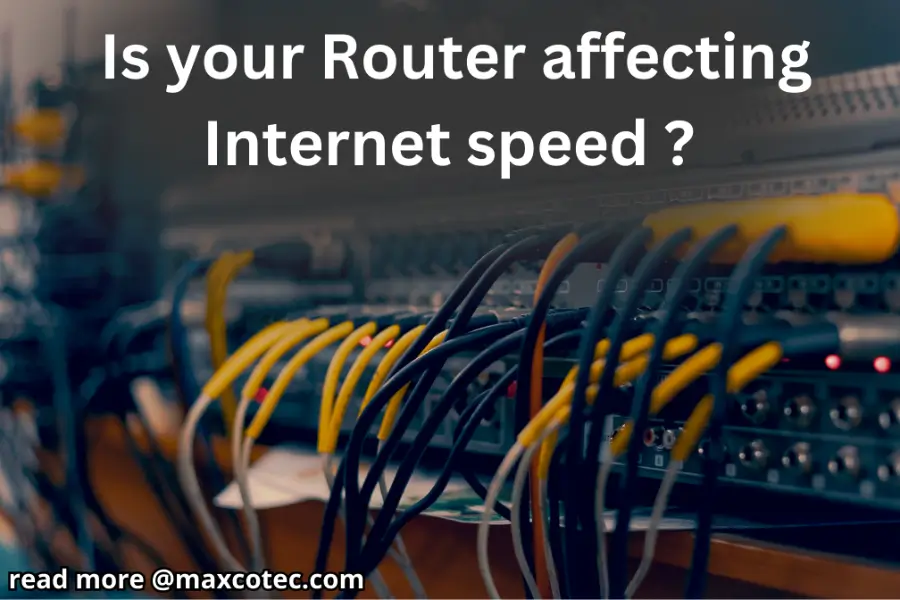A router is a device that bridges the gap between many networks. The router model, the number of connected devices, the router’s physical location, the type of internet connection, and the type of computer, can affect the speed of an internet connection.
The ideal router will be able to juggle many wireless connections at once while still providing fast downloads and crisp video streaming. A network’s performance can suffer significantly if a router is utilized that is not optimal for the network and internet service provider. As long as you can rely on your internet connection, speed is irrelevant. But, if you are looking for a better connection, we highly recommend Xfinity Internet!
Here’s everything you have to know about routers and internet speeds.
What Does Router Speed Have to Do With Internet Speed?

If you want the fastest possible connection, you must first understand the distinction between router and internet speeds.
What Does a Router Do?
The router allows devices to connect wirelessly or via wired Ethernet. Although wireless speeds have traditionally been criticized, current routers are able to deliver users much closer to the speeds promised by their service providers.
You should also be familiar with the WAN and LAN settings on a router, as well as the difference between bridge mode and router mode.
Why is Internet Router Speed Important?
Your internet speed may be slowed down by your router. For instance, if your router can only handle data at 100 Mbps and your internet plan supports 400 Mbps, you will experience slower speeds than advertised.
Why is Internet speed so Important?
The faster your internet connection, the more you can get done online or with your connected device. For the best results when watching videos or playing games online, a high-quality broadband or cable internet connection is required.
Can a Router Actually Slow Down My Connection?
While a router itself cannot slow down your internet connection, it can slow down the speeds at which your devices connect to your modem. This obstruction makes your internet link slow because the router is a slow link between you and the internet. When a router is overloaded, its throughput slows down. After all, the CPU can get heated and slow down under heavy pressure because it’s a tiny computer specifically designed to route network data.
Both the router and the present network load can contribute to overload. If your router is outdated or of poor quality, you may experience slow speeds. A network bottleneck can occur if too many devices try to send and receive data at the same time. Slow speeds might also be caused by a broken router.
The Ethernet port’s specifications should also be taken into account when you are establishing the cause for slow internet speed. However, if your router only has gigabit ports, the best you can hope for from an Ethernet connection is 1,000 Mbps of speed.
How Does a Router Affect the Internet Speed?

No router can make your internet connection any faster than your paid plan allows. However, it can lessen the effect in several ways.
Traffic Prioritization
Create a local area network (LAN) at your home or office by connecting all of your devices through your router. A unique IP address is given to each gadget, and data is directed to and from them individually. However, the router does not distribute data transmissions uniformly or randomly across all attached gadgets. Instead, it adapts to the specific requirements of each device. It’s like having an air traffic controller at your disposal: everything runs smoothly, nobody gets hurt, and everyone has what they need.
A router’s ability to differentiate between applications’ bandwidth needs and provide them with that bandwidth is a crucial feature. Using the router’s web interface, you can set bandwidth priorities using Quality of Service (QoS), ensuring that each application receives the throughput it needs to function optimally. Without prioritization settings in place, the router will treat all of these programs equally.
Dicover LunaPic – Best Free Online Photo Editor Tool in 2023 only on Tech Blogs In USA
Router Hardware
If your router’s hardware isn’t up to snuff, you won’t be able to take advantage of the fastest data plan your ISP offers. Your router will slow down your internet connection if this happens. As a result, you’ll experience the maximum speed your router supports. Your highest connection speed should be no greater than that of your slowest device.
If your internet plan is for 500 Mbps but your router is only capable of 300 Mbps, you will only be able to transfer data at the 300 Mbps maximum speed. The connection standard is another element in whether or not the router can handle higher speeds. These days’ wireless routers adhere to a wide variety of wireless standards, each with its own set of frequencies and data transfer rates. Internet speeds might be slowed by flaws and problems that are fixed in firmware upgrades, therefore it’s important to keep your firmware up to current.
In addition, it is possible that older routers running outdated software will struggle to locate the fastest and least congested networks. In addition, your gear and network may be vulnerable to attack because of outdated firmware.
Router Placement

Inadequate placement can slow down your internet connection even if you have the most recent firmware and a high-end router that is compatible with your data plan. Wi-Fi signals are radio waves that must propagate unimpeded in order to reach your gadgets. If there are barriers between them and your devices, they won’t be able to access them.Your internet connection may suffer if it is located near concrete walls, wood, or even water, all of which absorb Wi-Fi signals. Wi-Fi signal strength decreases as the distance increases between a router and a client device.
That’s why if you set your router in the living room, for instance, the signal will be weaker in the bedrooms. There are many things in a building that can emit radio waves and interfere with Wi-Fi signals, slowing down your internet connection. This is why your router will only ever provide you with half the speed it claims to be capable of.
Discover How You Can Watch the Best Online TV Shows and Movies For Free on SolarMovies
Is Your Router the Cause for Slow Internet Speeds?
Try running a speed test both with and without your network to get an idea of your download and upload speeds to see whether they are satisfactory. Not only will you be able to determine whether your router is to blame for the sluggishness, but you’ll also be able to compare your present speed to the results you get after adjusting your router.
You should also know the maximum speed of your current internet subscription before you conduct a speed test. You can verify the speed you’re paying for by logging into your ISP account or by contacting your ISP directly. Your router, not your actual internet connection, may be the problem in your network. If your router can’t handle the present network demand, upgrading to a plan with more bandwidth won’t help. You need to either restart it or replace it with a newer model.
All in All
After roughly five years of use, you will begin to have internet connection troubles, even if your router doesn’t die. Hardware failures and the lack of manufacturer-provided security patches are inevitable as your router ages.
If you want to maintain a good level of service, buying a new router is your best bet for a more rapid connection. While newer routers improve both performance and wireless signals, sluggish speeds can be fixed with firmware updates and network management solutions.






